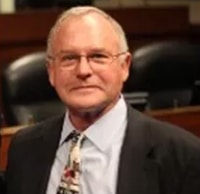
Keeping the federal contracting community going
With large numbers of federal employees forced into telework, the contractor community has been working with agency leadership and Congress so their companies and...
Best listening experience is on Chrome, Firefox or Safari. Subscribe to Federal Drive’s daily audio interviews on Apple Podcasts or PodcastOne.
With large numbers of federal employees forced into telework, the contractor community has been working with agency leadership and Congress so their companies and customer agencies can keep going. For a progress report, Federal Drive with Tom Temin turned to the executive vice president and counsel at the Professional Services Counsel, Alan Chvotkin.
Interview transcript:
Tom Temin: And Alan, how do things look from the ground level for contractors these days as we get into another week of this?
Alan Chvotkin: Tom, thanks for the opportunity to talk about it. I think you put your finger right on it. The goal here, for many federal agencies and for many contractors, is to just keep going. What can be a new normal under a telework environment under restricted access to facilities? And that’s where the company’s are working hard to find out what the answers are. We are too and I’m pleased that we’ve had the opportunity to engage with a number of federal agencies extensively over the past couple of weeks as circumstances change and his issues arise.
Tom Temin: Talk about the agency outreach because they are, I guess, improvising and learning as they go, just like the contractors are.
Alan Chvotkin: Very much so, and I’ve been really pleased, thrilled quite honestly, with both willingness to engage and the outreach that they are taking. The Defense Department we have called several times a week, and we have for the last couple of weeks under Ellen Lord’s leadership, with multiple trade associations talking through the issues that arise and results in not just the conversation but real action. So too with the agencies like the Department of Homeland Security or the Agency for International Development. We pose questions to those agencies and they answer. And sometimes just the knowledge about the government’s approach is so critical. It’s not unique there, we’re probably talking to five or six other agencies, including General Services Administration, the intelligence community and others. So we’re pleased with that. But we’re still having to do so on an agency by agency basis.
Tom Temin: Jason Miller of Federal News Network had a report that Homeland Security’s top procurement official, Soraya Correa, has been giving very specific instructions on say, if a contractor can’t get into a DHS facility, who to call on, what to do.
Alan Chvotkin: Exactly right. And and they’re making those available. They’re coming out to us asking us other organizations. What questions are we hearing from our members? What guidance do they need? And having that guidance is very, very valuable. We can agree or disagree or tweak it or wish it with something else. But still, having the knowledge for our member companies is critical.
Tom Temin: And what about the White House or the Office of Management and Budget? How have they been with respect to direct contact with the associations?
Alan Chvotkin: Well, we haven’t heard much recently. I’ve had a number of phone calls with the Office of Management and Budget, on the receiving end of a number of letters. You had Senator Warner the other day talking about his letter about the implementation of one of legislative provisions. They’re at the focal point of a lot of the engagement that we’re having with the agencies. They tell us that there’s an effort of coordination, but we haven’t had a as much direct engagement with OMB or the White House as I think would be valuable.
Tom Temin: Sure, Well, maybe they’re working through the agencies and figure that is how they are gonna take care of it. But my other question is, what about business? Is business continuing to flow as much as it can without people being in the buildings.
Alan Chvotkin: It appears to be yes, contractors are still being awarded to the best of our knowledge and solicitations are still being issued, evaluations are still being conducted. Only a handful of agencies that I’m aware of have pivoted almost exclusively to the COVID-19 focal area. And not every program, and not every office is functioning as if nothing happened. And that’s understandable. But overwhelmingly, the members, PFC member companies, tell us that they’re continuing to work. They’re continuing to receive contract awards. There are challenges of on boarding of individuals and things like that. But those are hiccups that are created because of the COVID-19, but they’re working their way through with the agencies.
Tom Temin: It could be that the far seeing agencies understand that with Congress so preoccupied, we had Ben Cardin (D-Md.) on last week and he was saying there could be a fourth, fifth, sixth and seventh stimulus bill to a follow on the big one that came out a couple of weeks ago. And yet there is the 2021 appropriations process. And maybe agencies feel that if there’s going to be an extended, continuing resolution at the end of the fiscal, they have to get work done now, get contracts out now, get programs launch now, even if it is difficult because of the separation,
Alan Chvotkin: Well you raise an important point and one that we’ve highlighted as well. One of the best stimulus activities that the Congress can support is the early enactment of the FY 21 appropriations to take away that element of uncertainty. To the extent that you can put people to work and having knowledge in advance of the work to be undertaken, that’s far more valuable than having a continuing resolution. And we saw when Congress enacted the full year appropriations bills for a number of federal agencies, including the Department of Defense and the Department of Health and Human Services, in advance of the federal fiscal year. Spending in the first quarter spiked significantly and overall spending was up because the agencies had the opportunity to plan and they had the opportunity to execute over a 12 month period of time rather than a shorter 6-9 month period of time. So we’ve been urging the Congress to use the regular appropriations process as part of a stimulus, even if there is fourth or fifth additional stimulus bill being considered to respond to the COVID-19 Pandemic.
Tom Temin: And the PSC has been seeking some legislative relief, possibly on deadlines for certain requirements, especially Section 889, that’s one of the NDA provisions, remind us which one that is and what you’re hoping for.
Alan Chvotkin: Well, Section 889 refers to a provision from the Fiscal Year 19 National Defense Authorization Act that prohibits the use of certain telecommunications and video surveillance, service’s and equipment. This is the Huawei, ZTE provisions when the topic was very hot. Last year, last August, the executive branch issued regulations that limited the amount the purchasing by federal agencies of certain designated equipment and services. This coming August, the law provides the prohibition on any contractor using those prohibited service is their products in the performance of the company mission. We don’t have proposed rules yet. They’re still in process for what this August 2020 deadline will be. So PSC joined with the National Defense Industrial Association, NDIA, in a letter to the members of Congress, to the chairs and ranking members of four committees, asking for a six month delay in the effective date of the statute to give time for the rulemaking to be issued, to give time for companies to address the significant internal operations while at the same time having to respond to the COVID-19. So we thought it was a common sense request. We’re hoping to find a vehicle that can move before August where Congress could take that action
Tom Temin: Any sense of whether you would get a positive response to that one?
Alan Chvotkin: We’ve had a positive response from a number of offices, but recognizing that this is not COVID-19 directly, I’m not sure exactly how where the votes would lie across the board. Some are strong supporters of a change. Some are strong supporters of continuing the pressure on some of these Chinese companies. But we had to ask, we thought we had asked early on in the process, it’ll give us time to highlight these issues to to the membership, to the Congress and hopefully give the Congress an opportunity to consider it.
Tom Temin: Alan Chvotkin is senior vice president and counsel at the Professional Services Counsel. Thanks so much.
Alan Chvotkin: Always a pleasure Tom.
Copyright © 2025 Federal News Network. All rights reserved. This website is not intended for users located within the European Economic Area.




